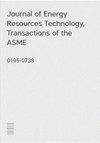气候变化对可再生能源的潜在影响以及电网可靠性和资源充足性的存储要求
IF 2.4
3区 工程技术
Q3 ENERGY & FUELS
Journal of Energy Resources Technology-transactions of The Asme
Pub Date : 2023-07-04
DOI:10.1115/1.4062891
引用次数: 0
摘要
本文研究了气候变化对间歇性可再生能源、电池储存和资源充足性的潜在影响。首先对气候变化模型和可用数据进行了评估,以确定新墨西哥州未来几十年太阳辐照度、温度和风速的不确定性和潜在变化,作为案例研究。然后在太阳能和风能模型中实施这些变化,以确定对可再生能源的影响。极端气候变化情景的结果表明,由于预计风速下降,预计风电功率可能会下降约13%。由于辐照度的降低和温度的升高,预计太阳能发电量可能会减少约4%。这些气候引起的风能和太阳能资源变化的不确定性被纳入概率模型中,该模型假设太阳能和风能资源的年度减少量分布均匀。电池存储性能的不确定性也根据温度升高、容量衰减和往返效率下降进行了评估。考虑到可再生能源和储能的这些不确定性,计算了全年电力负荷、发电和储能之间的小时能源平衡。对年负荷损失预期(LOLE)进行了概率评估,发现由于气候变化和电池存储性能和容量导致可再生能源的潜在减少,年负荷损失预计从约0天/年增加到约2天/年的中值。本文章由计算机程序翻译,如有差异,请以英文原文为准。
Potential Impacts of Climate Change on Renewable Energy and Storage Requirements for Grid Reliability and Resource Adequacy
This paper provides a study of the potential impacts of climate change on intermittent renewable energy resources, battery storage, and resource adequacy. Climate change models and available data were first evaluated to determine uncertainty and potential changes in solar irradiance, temperature, and wind speed in New Mexico in the coming decades as a case study. These changes were then implemented in solar and wind energy models to determine impacts on renewable energy resources. Results for the extreme climate-change scenario show that the projected wind power may decrease by ~13% due to projected decreases in wind speed. Projected solar power may decrease by ~4% due to decreases in irradiance and increases in temperature. Uncertainty in these climate-induced changes in wind and solar resources was accommodated in probabilistic models assuming uniform distributions in the annual reductions in solar and wind resources. Uncertainty in battery storage performance was also evaluated based on increased temperature, capacity fade, and degradation in round-trip efficiency. The hourly energy balance among electrical load, generation, and storage was calculated throughout the year given these uncertainties in the renewable energy resources and energy storage. The annual loss of load expectation (LOLE) was probabilistically evaluated and found to increase from ~0 days/year to a median value of ~2 days/year due to potential reductions in renewable energy resources caused by climate change and battery storage performance and capacity.
求助全文
通过发布文献求助,成功后即可免费获取论文全文。
去求助
来源期刊
CiteScore
6.40
自引率
30.00%
发文量
213
审稿时长
4.5 months
期刊介绍:
Specific areas of importance including, but not limited to: Fundamentals of thermodynamics such as energy, entropy and exergy, laws of thermodynamics; Thermoeconomics; Alternative and renewable energy sources; Internal combustion engines; (Geo) thermal energy storage and conversion systems; Fundamental combustion of fuels; Energy resource recovery from biomass and solid wastes; Carbon capture; Land and offshore wells drilling; Production and reservoir engineering;, Economics of energy resource exploitation

 求助内容:
求助内容: 应助结果提醒方式:
应助结果提醒方式:


